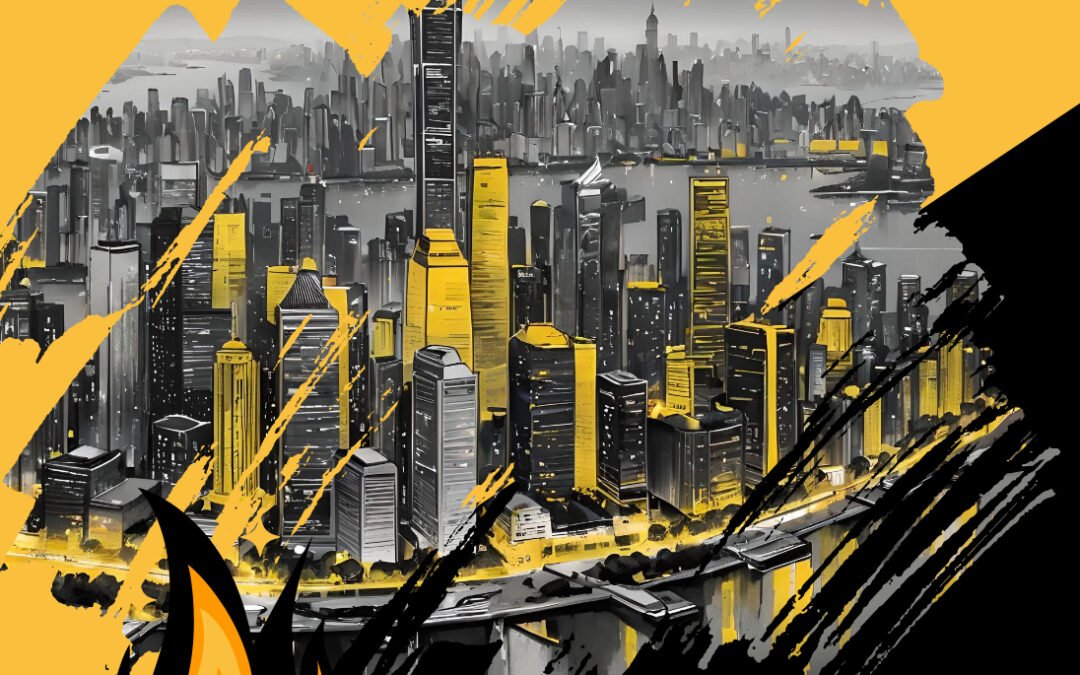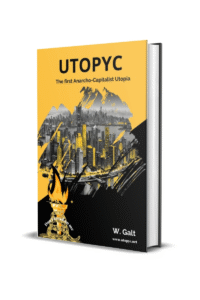Dear Reader,
This is not just another political article, nor a typical opinion column. It’s the beginning of a proposal. A journey. An invitation to think the unthinkable: What if you could live in a country without a State? What if you discovered that not only is it possible—but even desirable?My name isn’t important right now. What matters is what you’ll find if you choose to stay. In this new newsletter, you’ll explore ideas that few dare to touch: the end of the State, the possibility of a society based on voluntary contracts, the organization of justice, education, healthcare, and security… without politicians, without taxes, without government, without coercion.
This first article introduces Utopyc, the libertarian country I imagined—not as a fantasy, but as a realistic simulation of what could work tomorrow. It’s not a dream, but an alternative. Not a parody, but a possibility.
The Starting Point: Gabriel Dan, the Journalist Lost in Freedom
The story of Utopyc is told through Gabriel Dan, an investigative journalist who stumbles upon a rumor: there exists a small country that has abolished the State. Intrigued, he sets out to report on it. What he expects to be primitive chaos turns into a moral awakening. Dan is convinced that politics is essential, that public services are non-negotiable, that society cannot exist without taxes. In Utopyc, his statist and collectivist beliefs are shattered by a reality he never imagined possible.
There are no political institutions. No parties. No elections. No state police. No top-down laws. No “public” sector. And yet… everything works. Or rather: everything works better.
How a Stateless Country Works
On his journey through Utopyc, Gabriel explores every aspect of civic life:
· Healthcare that is private, efficient, and constantly innovating in the fight against disease.
· Education that is decentralized and unregulated, chosen by parents and students based on their own interests.
· Security provided by private agencies that serve the interests of their clients, free from political corruption and whims.
· Justice based on common law and social principles, not subject to legislative games or political manipulation.
· No taxes, no central banks, no economic planning, no fiat currency—only real money.
· Infrastructure built through private cooperation and decentralized coordination.
· Truly independent journalism, free from political pressure.
· Defense organized by citizens themselves, with no war industries or deep state lurking behind.
· Immigration governed by property rights of Utopyc’s citizens.
And every service? Cheaper and more effective than in state-dominated societies.
Dan witnesses the free organization of services, peaceful coexistence without legal coercion, and the beauty of a society without “authority.” He is amazed by the Museum of Liberty, the Museum of Poverty (which chronicles the misery caused by past States), and the Museum of Beauty, which celebrates unrestrained human creativity.
A Realistic Utopia: Libertarian Literature, Politics, and Philosophy
For 500 years, the concept of utopia has been monopolized by socialism. From Thomas More to modern dystopias, collective imagination has linked “utopia” with “planning.” Utopyc breaks that tradition. It shows that only freedom can create a truly harmonious society. That without a State, there can be more order, more justice, more humanity—and a kind of Humanism never before seen in history.
For 150 years, socialism has built mythologies in film, literature, and art. It won the cultural battle even while losing every economic one and oppressing countless people. Rothbard saw this. That’s why he called on libertarians to imagine, to narrate, to portray. To show what a world without coercion might look like. Utopyc is a direct response to that call. A work of fiction, yes—but also a roadmap toward what’s possible. I like to think that Utopyc is the novel Rothbard would’ve wanted to write.
If you enjoyed Atlas Shrugged or The Fountainhead, Utopyc is your next destination. Not because it copies them, but because it goes further: it doesn’t advocate retreat from the world—it dares to build a new one.
We said Utopyc is both a utopia and a dystopia. You’ll realize that the world you live in is the evil—and you’ll see clearly how to end it. We’ve grown so accustomed to the injustice around us that we no longer notice we’re forced to live in a perverse system—even in supposedly democratic countries.
In Utopyc, you’ll confront the wrongness of your own world and discover that there are serious, realistic ways to create one that’s not perfect, but far, far better.
Dare to visit Utopyc? (utopyc.net)
What Will You Find in This Newsletter?
Through this Substack, I invite you to join me in a deep—and provocative—exploration of libertarian thought. You won’t find “moderation” or centrism here. We’re going to talk about abolishing the State, redefining justice, questioning modern democracy, and reclaiming individual dignity from the grip of power.
I’ll write about:
· Current politics through a radical libertarian lens.
· Critiques of statism from history, law, philosophy, and literature.
· And of course, the expanding universe of Utopyc.
You’ll also hear about my other books, available at utopyc.net:
· Do You Being a Slave? A manifesto against today’s democracies, which have become brazen forms of fascism.
· The Rumor, a thriller about tyrannicide and a moral reflection on the legitimacy of resisting oppressive power.
· Cold Monster, a political dystopia about the self-destruction of the West, written as a political thriller.
Why Subscribe?
Because if you’ve ever thought, “There has to be another way to live,” but no one ever showed you one—here it is. Because if you’ve ever felt like a stranger in this world, maybe you’re not crazy—maybe you’re just free. Because if you know that the State isn’t a necessity but a superstition—this is your place.
Utopyc isn’t just a book. It’s a possibility.
A seed.
And this newsletter is its soil.Subscribe for free and start exploring with me the world that can be born when the State disappears—and liberty takes its place.


